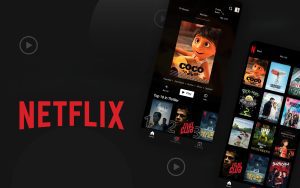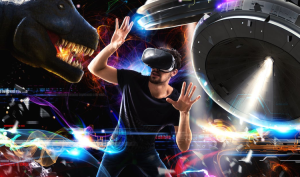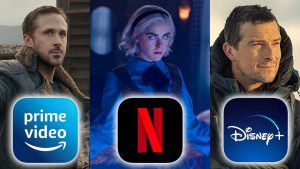Introduction
The media and entertainment industry is changing quickly. New technologies, shifts in how people consume content, and global trends are all having a big impact on the way entertainment is created, shared, and enjoyed. These changes are not just short-term—they’re part of a larger movement that is continually transforming the industry. In this article, we’ll look at seven major factors that are changing the media and entertainment world.
Top 7 Major Media & Entertainment Industry Factors
1. The Power of Technology: AI and Automation

One of the biggest changes in the media and entertainment industry is the rise of artificial intelligence (AI) and automation. AI is helping in many ways, such as recommending shows and movies on streaming platforms like Netflix or making the process of editing movies quicker and easier. AI can also help create content, like scripts and special effects, much faster than humans could.
Automation is also improving the way content is made and delivered. With better tools for editing, animation, and even sound design, producers can create high-quality content at a lower cost and in less time. These technological advancements are changing the way media is produced and consumed.
2. Streaming Platforms vs. Traditional TV

Streaming platforms like Netflix, Amazon Prime, and Disney+ have become the main way people watch TV shows and movies. Viewers can now choose what they want to watch and when, making the experience more flexible and personal. This on-demand model is much different from traditional TV, where viewers had to watch content at specific times.
As a result, traditional TV networks are struggling to keep up with the growth of streaming platforms. Many have started offering their own streaming services or are partnering with existing ones. With more people choosing streaming over cable, traditional TV networks are finding new ways to adapt to this shift.
3. Social Media and the Rise of Influencers

Social media platforms like Instagram, TikTok, and YouTube are not just places to stay in touch with friends anymore—they have also become powerful platforms for entertainment. Content creators, or “influencers,” are gaining huge followings and creating content that attracts millions of views. They have become major players in the media world, and many celebrities are building their careers through social media.
In fact, influencers are now a key part of advertising campaigns. Brands are turning to influencers to promote their products, often reaching more people than through traditional TV ads. Social media has also given a platform to independent creators, allowing them to build an audience without needing big production studios.
4. Changing Habits: What Consumers Want

Consumers today expect more control over their media. Rather than passively watching content, viewers want to interact with it, share their opinions, and even help create it. This change is seen in the rise of interactive content like video games, virtual reality (VR), and live streaming, where audiences can engage with the content in real-time.
Additionally, consumers are looking for more personalized content—something tailored to their interests. With so much content available, viewers want to watch things that speak directly to their tastes, and streaming platforms are helping make that happen through algorithms that suggest content based on past viewing habits.
5. Globalization and the Push for Diversity

The media and entertainment industry is becoming more global. Streaming services have made it easier to watch content from other countries, and international shows and movies are gaining popularity. For example, shows like Squid Game from South Korea and Money Heist from Spain have found huge audiences around the world.
The push for diversity is also an important trend. Viewers are demanding more representation in the media, and entertainment companies are responding. From casting choices to the stories being told, media is becoming more inclusive of different cultures, backgrounds, and perspectives. This trend is helping the industry appeal to global audiences.
6. Niche Content and Smaller Audiences

As the media world becomes more fragmented, there’s a rise in niche content. With so many different platforms and services, there’s a place for content that targets very specific interests. Whether it’s a streaming service dedicated to a certain genre of films, a YouTube channel for a specific hobby, or a podcast about a unique topic, smaller audiences are now able to find exactly what they want.
This trend means that creators no longer need to aim for the broadest possible audience. Instead, they can focus on specific groups of people and create content that speaks directly to their interests.
7. Blockchain and NFTs in Media

Blockchain technology and NFTs (Non-Fungible Tokens) are new ideas that are making their way into the media world. Blockchain is already being used to help protect digital content and ensure that creators get paid fairly for their work. NFTs, on the other hand, are a new way for creators to sell their digital art, music, and other content.
These technologies are still in their early stages, but they offer exciting possibilities for the future. NFTs, for example, allow creators to sell unique, limited-edition digital items, which could change how fans and collectors engage with media.
The Growth of Streaming Platforms

Streaming services like Netflix, Amazon Prime, and Disney+ have completely changed the way people watch TV shows and movies. Instead of waiting for a specific time to watch something, viewers can now choose when and what they want to watch. This has made entertainment more convenient and accessible. People no longer need cable TV subscriptions to enjoy their favorite shows. The convenience of streaming is a big reason why more people are moving away from traditional TV.
The Influence of Social Media on Entertainment
Social media platforms, such as TikTok, Instagram, and YouTube, have become key players in the entertainment world. These platforms allow creators to share their content with millions of people. Influencers and content creators are now reaching bigger audiences than traditional celebrities. Social media also helps promote new music, movies, and trends, making it easier for both new and established artists to gain popularity quickly. People are now looking to social media for entertainment and inspiration, which has changed how entertainment is consumed.
The Power of Artificial Intelligence
Artificial intelligence (AI) is making waves in the media and entertainment industry. AI helps create content faster by automating tasks like editing or adding special effects. It can also help personalize recommendations for viewers, suggesting shows and movies based on their past preferences. AI is even being used to create virtual actors and characters, which can change the way stories are told. The ability to use AI in so many ways is making entertainment more creative, efficient, and enjoyable.
The Demand for Diversity in Content

Today’s audience wants to see more diverse stories. People are looking for content that represents different cultures, backgrounds, and experiences. This demand for diversity is pushing the media and entertainment industry to be more inclusive. Filmmakers, producers, and creators are focusing on stories that reflect a wide range of perspectives. This trend is important because it makes the industry more representative of the global audience that watches movies, TV shows, and online content.
The Role of Mobile Devices in Entertainment
Smartphones and tablets have become essential tools for entertainment. People now watch movies, listen to music, and play games directly from their mobile devices. Apps for streaming, gaming, and social media are more popular than ever. This has made entertainment portable, allowing people to enjoy their favorite content anytime and anywhere. Mobile technology has also given rise to short-form content like TikTok videos, which are designed to fit into busy lifestyles.
How Gaming is Shaping Entertainment
The gaming industry is one of the fastest-growing areas in entertainment. Video games are no longer just for kids or teenagers; they are enjoyed by people of all ages. Popular games like Fortnite and Roblox allow players to socialize and interact in virtual worlds. Esports, or competitive gaming, is now a major industry, with tournaments being watched by millions online. Gaming is not only a form of entertainment but also a social experience that brings people together.
Challenges Faced by the Media and Entertainment Industry
Even with all these exciting changes, the media and entertainment industry faces some challenges. The rise of streaming platforms has led to an overload of content, making it hard for consumers to choose what to watch. Traditional TV networks are struggling to keep up with the shift to digital platforms. There are also concerns about privacy, especially with the amount of data being collected by streaming services and social media.
The Future of the Media and Entertainment Industry

Looking ahead, the media and entertainment industry will continue to evolve. New technologies like blockchain and NFTs (Non-Fungible Tokens) could change the way digital content is sold and traded. Content will become even more personalized, and viewers will have more control over their experience. As more people worldwide get access to streaming and social media, the industry will become more global, offering diverse content from different cultures. The future is exciting, with endless possibilities for innovation and creativity in entertainment.
Comparative Table: Traditional vs. Modern Media
| Feature | Traditional Media | Modern Media |
|---|---|---|
| Distribution | TV, Cable | Streaming Services |
| Content Creation | Studios, Networks | Independent Creators, AI |
| Viewer Engagement | Passive Viewing | Interactive, Social Media |
| Revenue Sources | Ads, Subscriptions | Digital Ads, NFTs, Subscriptions |
| Content Variety | Limited Channels | Wide Range of Options |
| Global Reach | Local Focus | Global Access |
Key Factors Driving Change in Media & Entertainment
| Factor | Impact | Key Players | Challenges |
|---|---|---|---|
| AI & Automation | Faster production, better viewer experiences | Netflix, Disney+, YouTube | High costs of tech integration |
| Streaming Services | Shift from cable TV to on-demand content | Netflix, Hulu, Amazon Prime | Content overload, subscription fatigue |
| Social Media Influence | Rise of influencers and independent creators | TikTok, Instagram, YouTube | Content overload, privacy concerns |
| Changing Consumer Habits | More personalized, interactive content | Twitch, Netflix, YouTube | Data privacy issues, maintaining demand |
| Globalization & Diversity | International content becomes mainstream | Netflix, Disney, HBO | Balancing global and local tastes |
| Niche Content | Rise of specialized content for smaller audiences | YouTube, Patreon, Indie Creators | Audience fragmentation, monetization |
| Blockchain & NFTs | New revenue models for digital content | OpenSea, Rarible, Digital Artists | Legal challenges, environmental impact |
Conclusion
The media and entertainment industry is changing rapidly. New technologies like AI and blockchain, along with shifts in consumer habits and the rise of streaming services, are reshaping how content is made, shared, and enjoyed. As the industry continues to evolve, staying adaptable and open to new ideas will be key to success. With more content, more ways to engage, and a focus on diversity, the future of entertainment is bright and full of possibilities.












